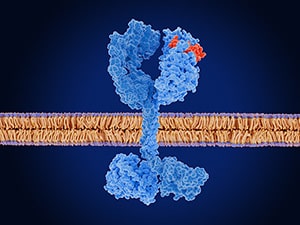Osimertinib Greenlit for Some Patients with Stage 3 Lung Cancer
The EGFR inhibitor osimertinib is now available as a monotherapy for certain patients with locally advanced, unresectable non-small cell lung cancer.
The U.S. Food and Drug Administration (FDA) has approved osimertinib (Tagrisso) to treat patients with locally advanced, unresectable stage 3 non-small cell lung cancer (NSCLC) that harbors certain epidermal growth factor receptor (EGFR) mutations (exon 19 deletions or exon 21 L858R substitutions) and that has not progressed on or after platinum-based chemotherapy and radiation therapy.

Osimertinib is a targeted therapy that inhibits EGFR, a protein that, when mutated, becomes hyperactive and drives cancer growth. While single-agent osimertinib has been previously approved for NSCLC that is either metastatic or resectable, this approval extends its availability as a monotherapy to patients with nonmetastatic and unresectable NSCLC. Osimertinib is also approved with chemotherapy for some patients with locally advanced or metastatic NSCLC.
The latest approval was based on results from the double-blind, randomized, placebo-controlled phase III LAURA clinical trial. The study enrolled 216 patients with locally advanced, unresectable, stage 3 NSCLC harboring EGFR exon 19 deletions or exon 21 L858R mutations. Patients were randomly assigned (2:1) to receive treatment with either osimertinib or placebo. None of the patients had experienced disease progression during or following treatment with radiation and platinum-based chemotherapy in the 42 days prior to randomization.
Patients in the osimertinib arm were 84% less likely than those in the placebo arm to have experienced disease progression or death after a median follow-up of 22 months, with median progression-free survival of 39.1 months and 5.6 months, respectively.
The recommended dose for osimertinib is 80 mg once per day.
NSCLC is the most common form of lung cancer, accounting for over 80% of lung cancer cases. Nearly half of EGFR mutations in NSCLC are exon 19 deletions and 35% are L858R mutations. According to federal statistics, it was estimated that 234,580 individuals would be diagnosed with lung cancer and 125,070 patients would die of the disease in the United States in 2024.
The FDA rendered its decision on September 25, 2024.